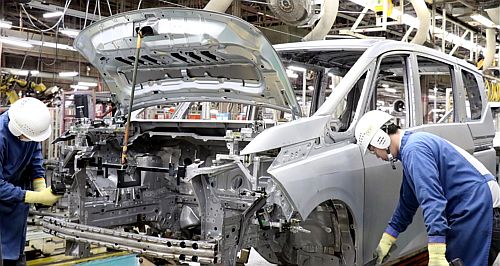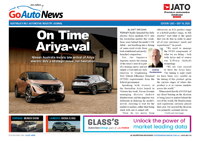Make / Model Search
News - NissanNissan to expand use of low-CO2-emission steelGreen steel ratio to increase at Nissan, as Hyundai dirty steel supply chain revealed11 Feb 2025 By MATT BROGAN NISSAN Motor Company has announced it will expand the use of low-CO2-emission steel manufactured in Japan.
It says the initiative will increase by a factor of five the proportion of low-CO2-emission steel used in 2025 compared to fiscal year 2023, forming part of its plans to reduce by 30 per cent its vehicle product life cycle by the end of this decade.
Nissan said it has “stepped up its efforts towards decarbonisation in the entire (manufacturing) process spanning from material procurement”.
Steel parts account for approximately 60 per cent of a vehicle by weight, meaning the use of low-CO2-emission steel will significantly contribute to reduced CO2 emissions throughout the entire vehicle lifecycle.
A significant portion of CO2 emissions originates from reducing iron ore in blast furnaces. With so-called green steel, Nissan aims to reduce CO2 emissions by using raw materials from iron ore to low-carbon-reduced iron, or by switching from blast- to electric arc furnace.
The news comes at the same time environmental groups blast Hyundai Motor Company for its use of so-called dirty steel.
American green group Mighty Earth has taken its call for Hyundai to act on climate abuses to the manufacturer’s North American headquarters in Los Angeles, delivering a letter to chief executive office Jose Munoz detailing the alleged impact of its steel supply chain on the planet.
The analysis reveals Hyundai Motor Company’s alleged continued reliance on “destructive practices in sourcing raw materials” for steel used in its vehicles, based on the examination of 57,402 shipments from 196 companies.
Mighty Earth alleges Hyundai Motor Company’s reliance on coal-based steel is worsening global warming and says the South Korean firm’s refusal to shift away from coal steel allows harmful practices in its supply chain to persist.
As the world’s third-largest automaker and owner of its own steel company, Hyundai has both “the opportunity and responsibility to lead change”, says Mighty Earth.
“Hyundai hides behind its glossy image, while choosing to ignore the horrors in its steel supply chain which cost lives and livelihoods,” said Mighty Earth senior director of decarbonisation Matt Groch.
“With recent shipments of dirty Russian coal to Hyundai Steel in South Korea, it’s clear the automaker doesn’t care where it gets its raw materials from.
“Its continued reliance on coal is a big issue for Hyundai and it needs to take urgent steps to phase it out, while also taking control of its supply chain to protect the environment and people’s lives.”
Beyond Russia, sources of coal for Hyundai’s supply chain extend to other regions with what Mighty Earth refers to as “severe environmental and human rights impacts”.
It says coal mining in Australia, Canada, and Colombia is linked to “environmental destruction”, such as habitat loss, water pollution, and huge quantities of climate destroying methane emissions.
“Having the automotive industry demand green steel can strongly motivate steelmakers to transition away from coal-based production to cleaner alternatives – and Hyundai Motors has a critical role to play in galvanizing this change,” added South Korean-based Solutions for Our Climate researcher Haebin Chang.
“Due to the automaker’s unique corporate structure and ties with POSCO and Hyundai Steel, the impact of Hyundai’s efforts to establish a clean supply chain will extend far beyond the company itself.”
Mighty Earth’s most recent letter to Hyundai Motor Corporation called for it to accelerate the transition to electric vehicles, decarbonise its steel supply chain, and to commit to phasing out coal.
The organisation claims that seven per cent of global emissions come from steel production, with the automotive industry the third-largest consumer of steel.
 Read more10th of February 2025  EU-China tariffs threaten Cupra brandVW Group execs warn jobs, Seat and Cupra brands at risk unless EU-China tariffs cut10th of February 2025  Ford goes down range extender roadLacklustre BEV sales and mounting losses prompt Ford to accelerate EREV development31st of January 2025  Tesla posts shaky finish to 2024Tesla’s last quarter income fell 71 per cent to $US2.3b, new models to return profit28th of January 2025  Alfa Romeo to abandon EV-only plans: reportUS head of brand says Alfa Romeo will revert to offering petrol, hybridised models24th of January 2025  Smart slows EV plans, adds PHEV #5UK report suggests Smart will wind back EV plans, introduce plug-in hybrid variants |
Click to shareNissan articlesResearch Nissan Motor industry news |











Facebook Twitter Instagram